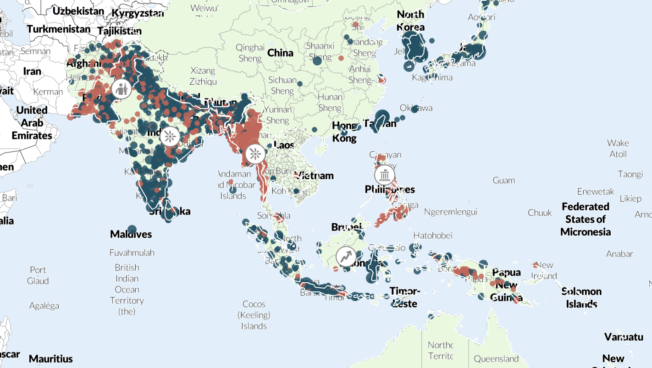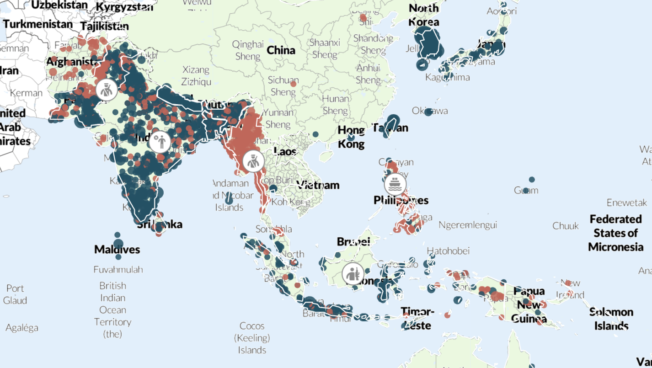Regional Overview
Asia-Pacific
February 2025
Posted: 10 February 2025
In this Regional Overview
- India: Security forces crack down on Naxal-Maoist rebels
- Myanmar: The military increases the use of deadly paramotors in its aerial campaigns
- Pakistan: Violence escalates further in Balochistan
- Papua New Guinea: Violence escalates in Morobe
- Philippines: The MILF and military clash months ahead of BARMM elections
India: Security forces crack down on Naxal-Maoist rebels
In January, Indian security forces intensified a crackdown on Naxal-Maoist rebels in the Red Corridor, the epicenter of the insurgency. More than 50 Naxal-Maoist rebels, including a senior member of the Communist Party of India (Maoist)’s Central Committee, were reportedly killed in January as security forces carried out anti-insurgency operations in Chhattisgarh, Jharkhand, and Madhya Pradesh states.1Shubhomoy Sikdar, ‘Central committee member among 14 Maoists killed in encounter at Gariaband in Odisha-Chhattisgarh border,’ The Hindu, 22 January 2025 According to ACLED data, armed clashes between security forces and rebels nearly doubled compared to the month prior, while reported fatalities from such clashes increased three times.
The operations followed a roadside bomb attack by Naxal-Maoist members on 6 January, which killed eight security personnel and a driver. This was the deadliest such attack against security forces since April 2023. The crackdown also follows an increase in rebel violence targeting civilians in December 2024, which police attributed to weakened Naxal-Maoist groups retaliating against civilians they accuse of being informants. Concerns persist that the latest operations may trigger further civilian targeting.
Myanmar: The military increases the use of deadly paramotors in its aerial campaigns
Amid an intensification of its aerial campaigns against resistance forces and civilians in January, the military increasingly deployed paramotors in addition to its standard mix of air and drone strikes. A paramotor is a motor-powered paraglider that one or two soldiers can use to drop explosives, fire upon targets on the ground, or undertake surveillance at low altitudes. ACLED records eight attacks using paramotors across Taungtha, Paletwa, and Sagaing townships in January, resulting in nine reported civilian deaths. In the deadliest such attack, the military used two paramotors to bomb Nyaung Kone village in Taungtha township on 18 January, reportedly killing four civilians. Alongside paramotor assaults, the military continued to use airstrikes to target crowds at resistance detention facilities, hospitals, mining operations, and potential New Year celebration sites. Airstrikes across the country reportedly killed more than 150 civilians in January, according to ACLED data.
The military’s increased use of paramotors is a significant development because they offer more precise strikes with small explosives at a much lower cost than fighter jets. This allows the military to maintain pressure across multiple fronts despite resource constraints.2Swel Taw, ‘The SAC has begun attacking with paramotors’, The Irrawaddy, 28 January 2025 While paramotors have limitations, their cost-effectiveness and flexibility may become a key element in the military’s aerial operations. Resistance groups still have yet to shoot a single paramotor down.3Aung Naing and Nay Min Ni, ‘Myanmar junta using paramotors to bomb villages in Mandalay, Sagaing regions,’ Myanmar Now, 7 January 2025 Paramotor attacks are likely to expand across the country in the coming months given resistance groups’ inability to counter them.
Pakistan: Violence escalates further in Balochistan
Political violence in Balochistan province became increasingly deadly in January, as Baloch Separatists and the Tehreek-i-Taliban Pakistan (TTP) intensified attacks against security forces and civilians. On 31 January, militants from the Balochistan Liberation Army-Azad group, which formed in 2017 after differences within the BLA leadership, killed 18 paramilitary soldiers after blockading a major road in Kalat district. The ambush resulted in the single deadliest attack by Baloch separatists against security personnel since ACLED began covering the region in 2018. The military response reportedly resulted in the deaths of 23 militants.
For its part, TTP militants attacked a paramilitary camp in Qilla Abdullah district on 27 January, demonstrating the group’s continued presence in Balochistan’s Pashtun-dominated districts.4The Balochistan Post, ‘Armed Men Storm Gulistan FC Fort in Qilla Abdullah, Inflict Casualties,’ 28 January 2025 The latest TTP attack came after military forces reportedly killed at least 11 militants attempting to cross the Afghanistan-Pakistan border between 18 and 22 January. Overall, reported fatalities in the province from violence related to armed clashes and remote attacks that involve militants and security forces nearly doubled in January compared to the month prior.
Papua New Guinea: Violence escalates in Morobe
Between late December and mid-January, Morobe province was the site of deadly blood feuds, which highlight how local law enforcement struggles to contain the effects of inter-communal violence in the region. On 30 December, the killing of a young man in Dona village led to his relatives attacking the village in retaliation by burning down 25 houses. This violence displaced over 200 people.5Velerie Bulumaris, ‘Homes set ablaze after youth’s killing,’ Post-Courier, 6 January 2025 Retaliatory violence occurred again on 4 January when the Papua New Guinea Defence Force Engineering Battalion violently responded to local youths stoning a soldier’s vehicle in Lae. The military’s retaliation lasted for two days — on 5 and 6 January — during which they destroyed property, burned homes, and attacked a man.6Post-Courier, ‘Unruly soldiers run riot at Second Seven,’ 10 January 2025 Further tit-for-tat violence also broke out in Sialum, Gitua, and Nadzab. Overall, ACLED records six violent incidents in Morobe in January, twice the monthly average for 2024. These incidents underscore the rising violence in the province, which the local administration claims it struggles to manage effectively due to inadequate funding and not enough personnel.7Pisai Gumar, ‘Two killed in Sialum area,’ Post-Courier, 14 January 2025. Print newspaper
Philippines: The MILF and military clash months ahead of BARMM elections
In the Philippines, lethal clashes involving the Moro Islamic Liberation Front (MILF) highlight the fragile security situation in the Bangsamoro Autonomous Region in Muslim Mindanao (BARMM) only a few months ahead of the first-ever BARMM parliamentary elections. On 22 January, two MILF members and two military soldiers were killed as a result of clashes between the MILF and security forces in Sumisip town, Basilan province — the first clash between the MILF and the military since March 2024. The MILF accused the military of not following proper coordination protocols in the area, which the MILF claims to control.8Ferdinandh Cabrera and Herbie Gomez, ‘MILF, military give conflicting accounts of deadly Basilan ambush,’ Rappler, 24 January 2025 The military denied this claim and said the soldiers’ presence there was part of an operation meant to protect United Nations Development Programme personnel working in the area.9Bong S. Sarmiento, ‘Basilan clash due to ‘lack of coordination’ – MILF-AHJAG official,’ Minda News, 23 January 2025
While the incident reveals the simmering tensions in the region, the MILF and the government both reaffirmed their commitment to the peace process and its mechanisms, according to an official statement by the government’s Peace Implementing Panel on 30 January.10Joviland Rita, ‘GPH, MILF to intensify ties after fatal Basilan clash,’ GMA News Online, 30 January 2025 Earlier in January, a MILF commander was killed in a clash with suspected clan militiamen in Cotabato City. According to reports, the killing was in connection with a longstanding rido — blood feud between clans.11Edwin Fernandez, ‘MILF member killed in Cotabato City ambush,’ Philippine News Agency, 9 January 2025 The BARMM elections, scheduled to be held on 12 May, are a requirement to fulfill the 2014 peace agreement that aimed to resolve the MILF’s decades-long separatist rebellion. The MILF currently heads the transitional institutions of BARMM, established as an autonomous region in a 2019 referendum in accordance with the peace agreement.
See More
See the Codebook and the User Guide for an overview of ACLED’s core methodology. For additional documentation, check the Knowledge Base. Region-specific methodology briefs can be accessed below.
Links:
- Methodology and Coding Decisions for Political Violence and Demonstrations in Afghanistan
- Methodology and Coding Decisions for Political Violence and Demonstrations in China and Taiwan
- Methodology and Coding Decisions for Political Violence and Demonstrations in Myanmar
- Methodology and Coding Decisions for Political Violence and Demonstrations in North Korea







